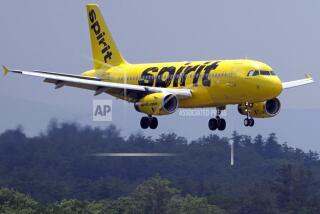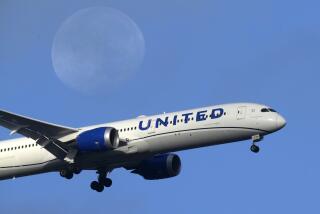Frequent-Flier Credits Probably Not Affected by Turmoil
- Share via
Despite the recent turmoil in the airline industry, experts say frequent-flier program members should consider their hard-earned miles to be safe.
With US Airways Group Inc. seeking bankruptcy protection and United Airlines threatening to follow suit, many frequent fliers are wondering about the credits they’ve accrued, even though both carriers have assured members they will continue operating as usual. Together, the two airlines have 60 million members in their frequent-flier programs.
“The gut reaction when you hear that an airline’s in trouble is to hurry up and cash in all of your miles,” said Randy Petersen, editor and publisher of Inside Flier magazine. “But the truth is, frequent-flier programs are the very last thing any airline is going to mess with. They’re too valuable.... These are the people they want to keep happy.”
The stock of frequent-flier miles has been valued at nearly $500 billion, making it the next-largest currency in circulation after the dollar. More than 13 million award tickets were given away by U.S. carriers in 2000, with the majority coming from American Airlines and Delta Air Lines.
But as many frequent fliers know from experience, using their points as freely as cash is not always easy. Since Sept. 11, the major carriers have cut the number of flights and, in many cases, have tighten restrictions on mile usage. And just this week, American, the nation’s largest carrier, announced plans to cut seating capacity by 9% and will eliminate first-class seats on certain international flights, which will make it harder for frequent fliers to get upgrades.
But the airlines, even those that are struggling financially, will continue to hand out free tickets because, experts said, it is the carriers’ relationships with corporate partners, which market the free miles, that have made the programs so lucrative.
Petersen estimates that United Airlines will make $1 billion this year selling free miles to such firms as telephone companies and credit card issuers, which then offer miles, or points, to their customers who use their services. More than half of all free miles are now accrued through methods other than flying.
“If they mess with the [frequent-flier] program, they’re losing income and they’ll be flying planes for free,” said Petersen, who has 900,000 miles accrued on United. “That’s the bottom line.”
On Friday, United Airlines sent notices to its 40 million members assuring them that miles would continue to be earned as usual, and that “you will continue to reap the benefits of Mileage Plus membership.”
When US Airways filed for bankruptcy protection earlier this week, a similar notice was sent to members encouraging them to continue flying and banking their rewards. US Airways spokesman David Castelveter said there has been no change in the airline’s frequent-flier program, and the carrier has noticed no change in its enrollment.
“We haven’t seen an unusual amount of activity with people cashing in their miles or pulling away from us,” said Castelveter, noting that of the airline’s 20 million frequent-flier members, 4.5 million are active. “We believe they have faith in what we’ve told them all along, that we’re hoping to emerge from our current status by the first quarter and we’re going to continue taking care of them like we always have.”
Experts pointed to previous airline bankruptcies as examples of the frequent-flier programs’ viability. Eastern Air Lines, Pan American World Airways and Trans World Airlines all had millions of frequent-flier miles outstanding when the firms finally collapsed. The miles were quickly absorbed by other carriers that wanted to add the members to their rosters, said Joe Brancatelli, an online business travel columnist.
“Basically, if you look at this historically, frequent fliers have never been completely abandoned when an airline goes out of business,” he said. “If anything, those miles are the most stable thing going on out there right now.”
Still, some program members make the mistake of assuming an airline is a bank. Accrued miles are never guaranteed and are always subject to the carrier’s policies, which can change with little or no notice, Brancatelli said. For that reason, he advises frequent fliers to use their free miles whenever enough credits have been earned to get them where they want to go--regardless of whether the airline is in trouble.
“Frequent-flier miles are like an unregulated lottery,” he said. “They are not protected, and you are never in complete control of them, because ultimately the airlines can always do with them whatever they want. That’s why they’re not in any more jeopardy now than they normally are.”
Alan Tomlinson, a San Diego frequent flier who sells cable networking services and has 120,000 miles accrued with United and Delta, said the financial concerns of the airline industry probably won’t stop him from flying.
“At least for me, it’s more important right now that I feel safe flying, not whether I can use my free miles,” he said.
“They’re not really yours until you cash them in anyway. They’re hypothetical. And they can be replaced.”
More to Read
Inside the business of entertainment
The Wide Shot brings you news, analysis and insights on everything from streaming wars to production — and what it all means for the future.
You may occasionally receive promotional content from the Los Angeles Times.










